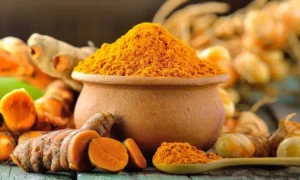Ayurveda stands out as a beacon of ancient wisdom, offering a comprehensive approach to managing and understanding chronic conditions, including Type 1 Diabetes. Unlike conventional medicine, which often focuses on symptomatic relief, Ayurveda delves deep into the root causes of diseases, promoting lifestyle and dietary adjustments alongside herbal treatments. This blog post aims to shed light on how Ayurvedic medicine for type 1 diabetes can complement the management practices, offering natural remedies, dietary recommendations, and more.
Contents
What Are The Ayurvedic Medicine For Type 1 Diabetes?
 Ayurveda, with its holistic approach to health and wellness, offers a range of herbs and supplements believed to help manage Type 1 Diabetes. It’s important to note, however, that these remedies should complement, not replace, conventional treatments like insulin therapy. Here’s an overview of some Ayurvedic medicine for type 1 diabetes:
Ayurveda, with its holistic approach to health and wellness, offers a range of herbs and supplements believed to help manage Type 1 Diabetes. It’s important to note, however, that these remedies should complement, not replace, conventional treatments like insulin therapy. Here’s an overview of some Ayurvedic medicine for type 1 diabetes:
Bitter Gourd (Karela)
Bitter gourd, or Karela, is highly regarded in Ayurvedic medicine for its potent anti-diabetic properties. This vegetable is a rich source of three specific active substances: charantin. This is known for its glucose-lowering effect; vicine; and an insulin-like compound known as polypeptide-p. These components work in synergy or individually to help reduce high blood sugar levels. Consuming bitter gourd juice on an empty stomach or including it in meals can offer therapeutic benefits.
Fenugreek (Methi)
Fenugreek seeds are invaluable in Ayurveda for their high soluble fiber content. This assists in controlling diabetes by slowing down the digestion and absorption of carbohydrates. This, in turn, can lead to a reduction in blood sugar levels. Fenugreek also enhances insulin sensitivity and insulin secretion. These are crucial for managing Type 1 Diabetes. The seeds can be soaked in water overnight and consumed in the morning, or the powdered seeds can be added to dishes as a spice.
Gymnema Sylvestre (Gurmar)
Gymnema Sylvestre, known as Gurmar or “sugar destroyer” in Ayurveda, plays a significant role in diabetes management. The herb contains gymnemic acids. This helps reduce the absorption of sugar in the intestines and may aid in stimulating insulin production in the pancreas. Additionally, it is thought to promote the regeneration of islet cells, which are responsible for producing insulin. And thus, it might help in improving the body’s natural insulin levels.
Cinnamon (Dalchini)
Cinnamon is celebrated not only for its flavor but also for its medicinal properties, including its potential to lower blood sugar levels. It contains bioactive components that may mimic insulin, improving glucose uptake by cells and thereby lowering blood sugar levels. Incorporating cinnamon into one’s diet, whether by sprinkling it on foods or taking it as a supplement, can be a beneficial part of a holistic diabetes management strategy.
Turmeric (Haldi)
 Turmeric, with its active ingredient curcumin, offers powerful anti-inflammatory and antioxidant properties. Its potential to lower blood sugar levels and improve insulin sensitivity makes it a valuable tool in the management of Type 1 Diabetes. Curcumin’s role in reducing inflammation and oxidative stress is particularly beneficial, as these are common complications in diabetes. Regular consumption of turmeric can support better blood sugar control and overall health.
Turmeric, with its active ingredient curcumin, offers powerful anti-inflammatory and antioxidant properties. Its potential to lower blood sugar levels and improve insulin sensitivity makes it a valuable tool in the management of Type 1 Diabetes. Curcumin’s role in reducing inflammation and oxidative stress is particularly beneficial, as these are common complications in diabetes. Regular consumption of turmeric can support better blood sugar control and overall health.
Aloe Vera
Aloe Vera is known for its soothing and healing properties, but it also has benefits for blood sugar regulation. The gel from Aloe Vera leaves contains phytosterols that may have a beneficial effect on glycemic control. These compounds can help lower fasting blood glucose levels and improve glucose metabolism, supporting the management of Type 1 Diabetes. Aloe Vera juice or supplements can be a part of a diabetes care regimen. However, it’s important to ensure the purity and safety of the products used.
Triphala
Triphala offers a unique blend of antioxidants that support overall health and well-being. Its benefits extend to improving digestion and promoting detoxification. This indirectly can influence blood sugar regulation. Triphala’s role in diabetes management is linked to its potential to reduce oxidative stress and inflammation, two factors that can exacerbate diabetes symptoms and complications. Available in various forms, including powder, tablets, and liquid, Triphala can be easily incorporated into daily routines.
Shilajit
Shilajit, a sticky substance found primarily in the rocks of the Himalayas, is rich in fulvic acid and has been used in Ayurveda for centuries for its rejuvenating properties. It’s believed to enhance pancreas function, potentially stimulating insulin production. This supplement may help in improving the body’s natural ability to utilize glucose and maintain stable blood sugar levels.
Ayurvedic medicine for type 1 diabetes emphasizes a personalized approach, recognizing that individual needs vary. Therefore, what works for one person may not work for another, underscoring the importance of personalized medical advice.
What Are Other Ayurvedic Remedies For Type 1 Diabetes?
Ayurveda encompasses a holistic approach to health that goes beyond just herbs and supplements, emphasizing lifestyle strategies and dietary habits as integral components of managing Type 1 Diabetes. These strategies focus on creating a balanced internal environment that can help stabilize blood sugar levels and enhance insulin sensitivity.
Yoga and Pranayama
Yoga, combined with breathing exercises (Pranayama), can be incredibly beneficial for individuals with Type 1 Diabetes. Specific yoga asanas (poses) like Vrikshasana (Tree Pose), Tadasana (Mountain Pose), and Bhujangasana (Cobra Pose) can promote mental relaxation and physical strength. Pranayama techniques such as Kapalbhati (Skull Shining Breath) and Anulom Vilom (Alternate Nostril Breathing) help regulate the body’s metabolic activities and reduce stress levels, directly impacting blood glucose control.
Daily Routines (Dinacharya)
Ayurveda emphasizes the importance of a regular daily routine (Dinacharya) for maintaining optimal health. This includes waking up early in the morning, and practicing self-hygiene rituals like tongue scraping and oil pulling, followed by physical exercises. Establishing a routine helps regulate the body’s natural rhythms, supporting better metabolic function and insulin sensitivity.
Adequate Sleep
Good quality sleep is crucial for maintaining hormonal balance and regulating insulin sensitivity. Ayurveda suggests going to bed early and ensuring 7-8 hours of restful sleep to support the body’s healing processes and maintain glucose homeostasis.
Whole, Unprocessed Foods
Emphasizing a diet rich in whole, unprocessed foods is a cornerstone of Ayurvedic nutrition. Foods that are high in fiber, such as whole grains, legumes, vegetables, and fruits (in moderation), are recommended to help maintain stable blood sugar levels throughout the day.
Incorporate Ayurvedic Superfoods
Certain foods are considered “superfoods” in Ayurveda due to their nutrient density and health benefits. These include Quinoa, and Millets, which are high in fiber and protein. Also, have a lower glycemic index compared to other grains. Including these foods in the diet can help in maintaining steady glucose levels.
Healthy Fats and Proteins
 Incorporating healthy fats from sources like ghee (clarified butter), nuts, and seeds, along with adequate protein from plant-based sources, can slow carbohydrate absorption. And, helping to prevent spikes in blood sugar levels. Ayurveda also suggests moderate consumption of dairy products, especially those that are not heavily processed, to support overall nutrition without adversely affecting glucose metabolism.
Incorporating healthy fats from sources like ghee (clarified butter), nuts, and seeds, along with adequate protein from plant-based sources, can slow carbohydrate absorption. And, helping to prevent spikes in blood sugar levels. Ayurveda also suggests moderate consumption of dairy products, especially those that are not heavily processed, to support overall nutrition without adversely affecting glucose metabolism.
Herbal Teas
Drinking herbal teas made from herbs such as Tulsi (Holy Basil), Cinnamon, and Fenugreek can be a soothing way to incorporate beneficial herbs into your daily routine. These teas can help in managing blood sugar levels and offer additional health benefits.
Incorporating these Ayurvedic remedies into your lifestyle and diet, along with regular medical supervision, can provide a comprehensive approach to managing Type 1 Diabetes. It’s important to remember that these practices should complement, not replace, conventional diabetes treatments and medications.
Benefits And Risks of Ayurvedic Medicine For Type 1 Diabetes
Ayurvedic medicine for type 1 diabetes offers several benefits. However, it comes with potential risks, especially when not properly coordinated with conventional medical treatments. Understanding these benefits and risks can help individuals make informed decisions.
Benefits
- Holistic Approach: Ayurveda looks beyond the physical symptoms to the emotional and spiritual aspects of an individual’s life, offering a comprehensive approach to disease management. This holistic perspective can lead to improved overall health and well-being.
- Emphasis on Diet and Lifestyle: Ayurveda places a significant emphasis on diet and lifestyle modifications. These are crucial for managing Type 1 Diabetes. Adopting an Ayurvedic lifestyle can help individuals develop healthier habits that support blood sugar regulation and enhance insulin sensitivity.
- Stress Reduction: Practices such as yoga and meditation are integral to Ayurveda and have been shown to reduce stress levels. Since stress can negatively affect blood glucose levels, these practices can be beneficial for individuals with Type 1 Diabetes.
- Reduced Risk of Complications: By focusing on overall wellness and the prevention of disease, Ayurvedic practices can potentially reduce the risk of cardiovascular disease, neuropathy, and kidney damage, through improved lifestyle choices and natural supplementation.
- Personalization: Ayurveda offers personalized treatment plans based on an individual’s unique constitution (Prakriti) and the current imbalance (Vikriti). This tailored approach can be more effective for some individuals than a one-size-fits-all treatment plan.
Risks

- Lack of Scientific Evidence: While there is growing research on herbs, the scientific evidence supporting their efficacy is still limited. This can make it challenging to predict outcomes or ensure the safety of certain remedies.
- Potential for Herb-Drug Interactions: Some Ayurvedic herbs may interact with conventional diabetes medications, potentially affecting their efficacy or leading to adverse effects. It is essential to consult healthcare providers before combining these treatments.
- Quality and Purity Concerns: The quality and purity of Ayurvedic supplements can vary. And there have been instances of products contaminated with heavy metals or other impurities. It’s crucial to source these products from reputable suppliers.
- Overreliance on Ayurvedic Treatments: There’s a risk that individuals might rely solely on Ayurvedic treatments and neglect conventional medical care, such as insulin therapy, which is critical for managing Type 1 Diabetes. This overreliance can lead to poor blood glucose control and an increased risk of complications.
- Delayed Treatment: In some cases, individuals may delay seeking conventional medical advice in favor of exploring Ayurvedic remedies, which can lead to the worsening of their condition. Early and ongoing medical treatment is essential for managing Type 1 Diabetes effectively.
Coordination between conventional and Ayurvedic treatments ensures the best outcomes and minimizes risks. Ultimately, enabling individuals to enjoy the benefits of both worlds.
Conclusion
In conclusion, Ayurvedic medicine for Type 1 Diabetes offers a unique and holistic approach that emphasizes the importance of diet, lifestyle modifications, and natural remedies. While this can provide numerous benefits, it’s essential to approach this integration with caution and informed knowledge. By thoughtfully combining Ayurvedic practices with conventional diabetes management, individuals can explore a comprehensive pathway toward improved health and well-being.
Do you want to get rid of diabetes? Join our online diabetes treatment program and reverse Diabetes naturally through lifestyle changes such as a Personalized Diet plan, Exercise, Yoga, dieticians, and health coaches.

